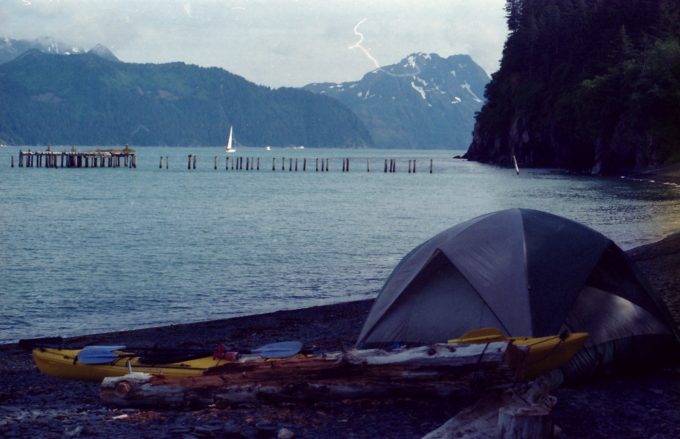 Camping. You spend a couple hours running around your perfectly stocked home gathering all the things you will need to ‘survive’ for a night or two in the woods. You leave behind your comfortable bed, instead grabbing a thin pad and stuff sack that you will be stuffed into for a night of cold hard sleep filled with unnerving buzzing. You take your toothbrush from your sparkling, engineering brilliance of a bathroom with plans to swap it for tree stumps and wet-wipes. And your kitchen. You have all the amenities needed to create beautiful meals efficiently, providing nutrition and nourishment to your growing family. Sure! Why not trade that in for a black griddle and a couple of pointed sticks!
Camping. You spend a couple hours running around your perfectly stocked home gathering all the things you will need to ‘survive’ for a night or two in the woods. You leave behind your comfortable bed, instead grabbing a thin pad and stuff sack that you will be stuffed into for a night of cold hard sleep filled with unnerving buzzing. You take your toothbrush from your sparkling, engineering brilliance of a bathroom with plans to swap it for tree stumps and wet-wipes. And your kitchen. You have all the amenities needed to create beautiful meals efficiently, providing nutrition and nourishment to your growing family. Sure! Why not trade that in for a black griddle and a couple of pointed sticks!

Camping = Cramming all your junk into the back of the car…

…then adding the children.
The good news is that you pay your mortgage and this beautiful, easy-to-use living space will be there for you, just as you left it, when you come back. However, you are going to literally pay nearly that same price, to sleep terrible, get a stiff back, eat gritty food, and have children so dirty you can’t even find them anymore. THEN you have to come home unpack all that crap, wash all your clothes, and shower with steel wool, just to bring yourself back to the standard of living that you never needed to leave in the first place!
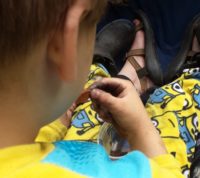
Yes, I let him eat with those fingers.
Why are we doing this again?
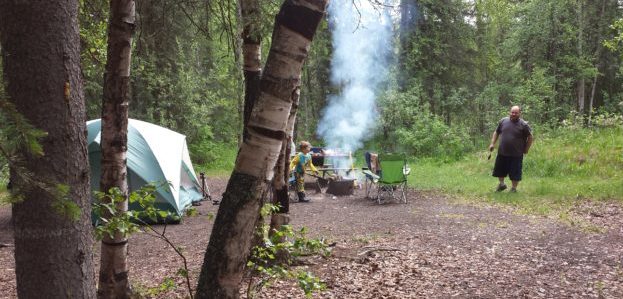
Camping in Eagle River June, 2016
In fact we camped for a single night this last weekend and I did, seriously, ask myself, “Is this worth all the effort?” When we came back home, a mere 18 hours later, we had unpacked (in 1/3 the time it took to pack) and were right back where we would have been at 1 o’clock of any other Saturday, however, we had already chopped, flamed, cooked, hiked, biked, played, talked, drawn, explored, pretended, learned, rested, bonded, slept in a tent, and peed in the woods! There is no way we would have been able to do all that on any other Friday night at home.
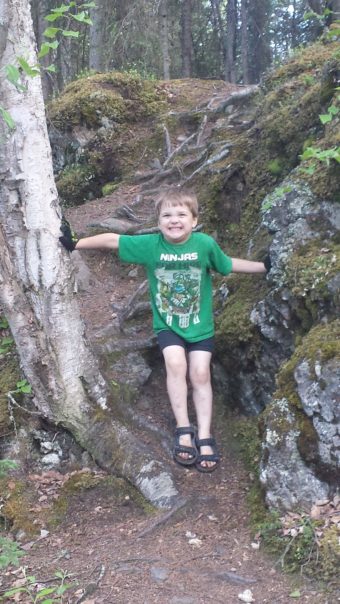
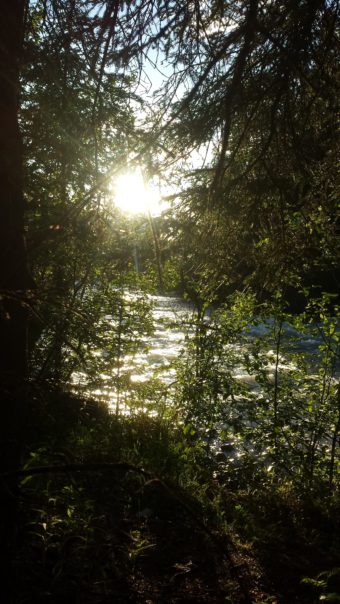
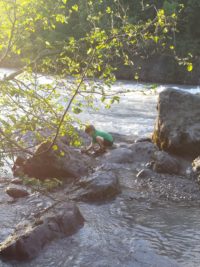
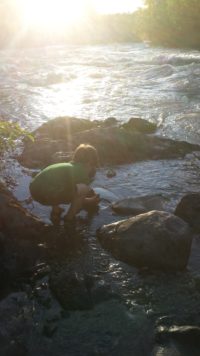
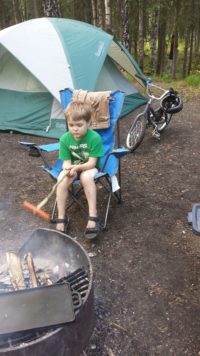
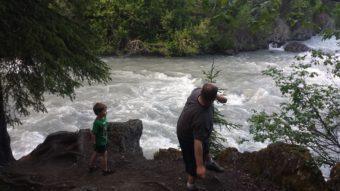
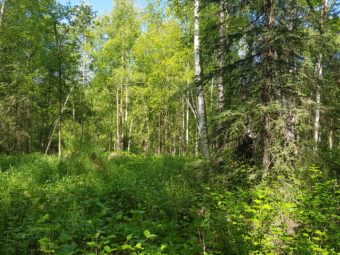
Whether it’s for one night or 4 and whether you tent, take the canoe, backpack-in, or bring the whole kit-and-kabootle in your RV… Camping. We’ve all done it. And we do it again and again! And we love it, right? Well, kids do anyway. And I am a firm believer that camping is not only good for all of us, and families in particular, but it’s critically important for our children, and here is why:
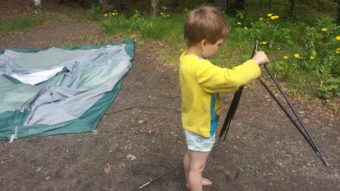
Helping Mommy take down the tent.
1-Skills to Learn:
– First and foremost, packing and making a list so you don’t forget anything. And double checking! Things I can remember forgetting (sometimes more than once): lighter/matches, can opener, paper towels/soap/handsanitizer, Bug Dope!, TOILET PAPER, pillows, cork screw, warm socks, pocket knife, headlamp, (we don’t need them through the Alaska summer, until the fall and then forget it.), THE TENT <— seriously I forgot that once. Then there are the things you bring and NEVER use: Books, board games, a guitar, too much food… that list goes on and on and on…
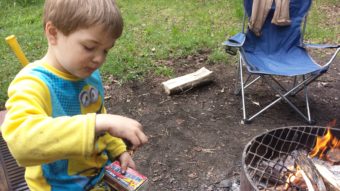
A safe place to practice lighting matches.
– “Full hand in, full hands out.” I’m pretty sure we all know about this ‘everyone do their share’ rule.
– How to set up (AND TAKE DOWN) a tent.
– How to light a camp fire: stacking wood, how to use matches properly, what kindling is, and ax safety.
– How to do your ‘business’ in the woods.
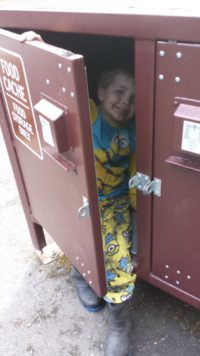
A very dirty boy learning about Bear Safety and food caches.
– Keeping your site clean. This goes along with ‘Leave No Trace’ and is also very important for bear safety and awareness.
– Cooking over a fire. There are a lot of ways to do this, and how to cut a good roasting stick, and knife safety are surely important skills, but also using a fire pit for a frying pan, griddle, or dutch oven bring cooking back to its roots.
– Boundaries and keeping yourself safe. This is the part where kids start to realize that boundaries are set for a reason and they need to abide by the rules. There is a lot of that involved in camping, “Don’t play too close to the fire.” “Don’t go to the edge of the river or that bank.”… but also,
– Independence. This isn’t your gangsta neighborhood. I want my child to be able to go to the outhouse nearby without me. I want them to be able to check out some woods around, and a little out of sight. I want to trust them to make smart decisions about what is safe and what is not. It goes hand-and-hand with ‘boundaries’ above. The ability of ‘self-boundary-ing.’
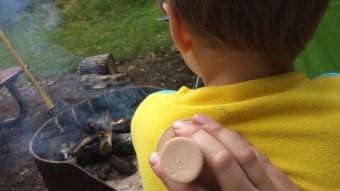
“No video games for CPT?!” We watched Daddy [struggle to] build the fire instead.
– What? No TV?! That’s right! Besides your camera and flash-lights, if it has batteries leave it home! Put down the smart phone for a while.
– Enjoy simply sitting around the campfire together. This is a chance to listen to your children make conversation. You might be surprised to learn something new they are interested in, or perhaps you/they need to simply practice the ability to make and carry on a conversation. A lot of this is getting lost these days.
– If you involve your kids in all of the processes of camping; set-up, making the fire, cooking… you might find that their day is already pretty filled with activity.
– A picnic table is a great place to play games together. Card games (even those nerdy ones) are great, and dice games.
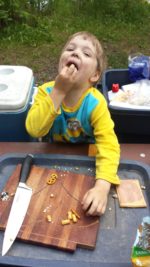
We used pretzels to learn that 1-1/2 + 1-1/2 = 3… minus 1-1/2 = a silly boy.
– There are a lot of great books with ideas for other camping activities if you need a little help in this area. I personally like “The Kids’ Outdoor Adventure Book” by Stacy Torino, with a check-list list of 448 outdoor things listed to do before growing-up. I’ve also used “Camp Out!”e
by Lynn Brunelle, and ““The Kids Campfire Book”
“ by Jane Drake and Ann Love. They’re all pretty cheap, but you can always save yourself some bucks and burrow from the library.
– If you or your children are the artsy/crafty kind it’s easy to bring low maintenance craft supplies; colored pencils, oil pastels, charcoal. Spend time looking and recreating the views around you. You might be surprised what a child can make with just a little glue and natural materials. (Hot glue gun works really well for this, though it does break the ‘electricity use’ rule) When I was 7, I would glue little rocks to big rocks, or glitter onto shells, and walk around from RV to RV selling them as paperweights. I made $7 one camp-out.
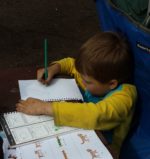 The point is to slow down; way down. Talk to each other. Look at each other when you are talking. Or sit quiet with nothing to say. This can be just as beneficial.
The point is to slow down; way down. Talk to each other. Look at each other when you are talking. Or sit quiet with nothing to say. This can be just as beneficial.
3-Health: Mental and Physical:
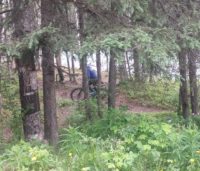
Nathan was excited to see a ‘real mountain biker’ on a fat bike. “He’s riding over roots!” (That’s the big accomplishment this summer on his bike; being able to ‘ride over roots’)
– Obviously we all know that just being outdoors is good for us; fresh air, sunshine, the breeze, the smell of fresh earth.
– There are a lot of muscles used for camping that you don’t use putting a movie on at home. Hauling things, chopping things, crawling in and out of your tent; these are all little tiny forms of exercise that you will probably notice the first day you are back from camping. Not to mention any hiking or boating you may do.
– When I was 9 I wanted to be a professional jump-roper and would jump-rope all around the campground. Another classic: bring your childrens’ bicycles. This might be the first safe place they can bike freely without worry of fast moving traffic. Nathan was excited to get to, “ride over roots like a real mountain biker!” Your kids can run around free without their own stress over safety.
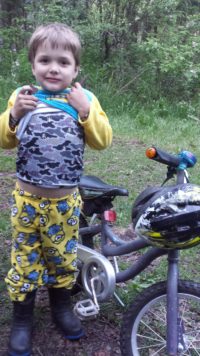
Showing off his extra layers.
– And obviously, if you ‘unplug,’ get off the social media networks, and turn off work for a day or two you’ll find that the refreshing your mind goes through camping is far better than that of a normal day off at home.
4-Learning about the Natural Sciences:
– Take a nature walk. Just being out in the fresh air is good for us, but taking the time to look for the little beauties in life is not only pleasant, but it’s educational for all involved. Bring a plant book and try to identify a couple of flowers or trees. Teach your children that answers can be found in books and not just on a smart phone. Bring binoculars and look for birds. It’s a guarantee that both you and your children will learn something if you take the time to look.
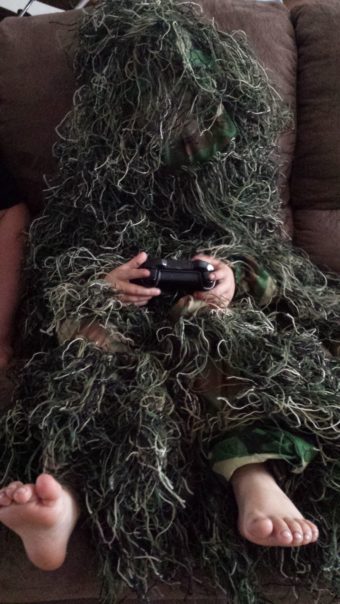
Sometimes you have to bring a little nature home with you.
– Even if you don’t bring your rocks and minerals book, taking the time to set up a few nice photos will give you a bit of nature to bring home. It’s the digital age, let your children try their hand at photography. If they get something they really like it can be a badge of honor on their bedroom wall, and a constant reminder of how great it is to get out in the out-of-doors.
– Create temporary habitats for a butterfly, caterpillar, or other creepy-crawly. Your squeamish one might find them not to be so ‘icky’ after-all.
– One of the best things for children to learn about nature is the need to respect and protect it. Now I’m not a tree-hugger or bunny-snuggler, but I do want my children to understand that if we want the next guy to enjoy what we’re enjoying it needs to be taken care of, and that if we aren’t going to eat or use it we shouldn’t kill or destroy it. This is great especially for boys. One day they are going to have a beautiful, flower-of-a-wife, and they will need to treat her as such.

We got to see a biplane fly over!
5-Creative Expression:
Ok, obviously we talked about sharing your thoughts (a form of creative expression), and drawing or crafting, and even photography, but what other forms of creative expression can we have while camping that might not happen at home?
–Imaginative play! That’s right folks, sticks are swords, rocks are fruits, and leaves are money! Step right up! Without all the fancy-shmancy do-hickeys and thingers from home, children are left to create their own! I don’t think I even need to say more.

…and this thing, whatever it is.
So if you haven’t gotten out camping for a while or think it might not be worth all the effort I hope this has helped you to reconsider.

Post a comment